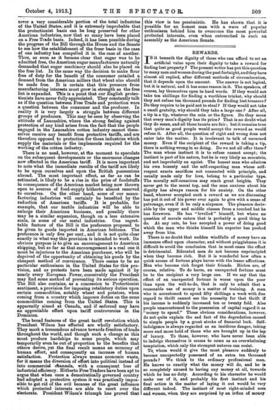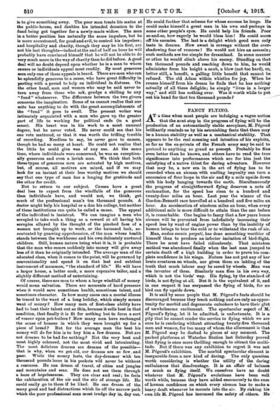REWARDS.
TS it beneath the dignity of those who can afford to set an artificial value upon their dignity to take a reward for finding lost property ? The present writer has put this question to many men and women during the past fortnight, and they have almost all replied, after different methods of circumlocution, that it depends upon the amount. The answer is not logical, but it is natural, and it has some reason in it. The speakers, of course, lay themselves open to hard words. If they would not take ten shillings for finding a worthless trinket, why should they not refuse ten thousand pounds for finding lost treasure ? Do they require to be paid not to steal ? If they would not take a small gratuity, why should they take a large one ? After all, a tip is a tip, whatever the coin or the figure. Do they mean that every man's dignity has its price ? That is no doubt what they do mean, and all these taunts are fair ; but it remains true that quite as good people would accept the reward as would refuse it. After all, the question of right and wrong does not enter into the matter. It is irrelevant to talk of unearned money. Even if the recipient of the reward is taking a tip, there is nothing wrong in so doing. Do we not all offer them ? The man whose instinct it is to refuse cannot accept; the instinct is part of his nature, but he is very likely an eccentric, and not improbably an egoist. The honest man who admires his own honesty and the self-respecting man whose self- respect exacts sacrifices not connected with principle, and usually made only for love, belong to a particular type. The morally self-conscious may reach great heights. They never get to the moral top, and the man anxious about his dignity has always reason for his anxiety. On the other hand, whoever accepted such a reward as we are discussing has put it out of his power ever again to give with a sense of patronage, even if it be only a sixpence. The pleasure deriv- able by the upper and middle classes from a touched hat he has forsworn. He has "levelled" himself, but where no question of morals enters that is probably a good thing to do. At any rate, he has accepted a power of doing good which the man who thinks himself his superior has pushed away from him.
There is no doubt that sudden windfalls of money have an immense effect upon character, and without priggishness it is difficult to avoid the conclusion that in most cases the effect is detrimental. Educated men do not become unprincipled when they become rich. But it is wonderful how often a quick access of fortune plays havoc with the lesser affections. Men who become rich forget their friends. Riches are, of course, relative. To do harm, an unexpected fortune must be to the recipient a very large one. If we say that the effect of an unexpected fortune is worse upon the poor than upon the well-to-do, that is only to admit that a reasonable use of money is a matter of training. A man who is accustomed to spend fifty shillings a week with due regard to thrift cannot see the necessity for that thrift if his income is suddenly increased ten or twenty fold. Also people unaccustomed to the possession of capital regard it as "money to spend." These obvious considerations, however, do not quite explain the sad fact of the degradation caused to simple people by a great stroke of financial luck. Self- indulgence is always regarded as an insidious danger, taking more and more hold of those who are brought up in the lap of luxury. To those, however, who have never been able to indulge themselves it seems to come as an overwhelming temptation, which only the strongest natures can resist.
To whom would it give the most pleasure suddenly to become unexpectedly possessed of an extra ten thousand pounds ? We think to the ordinary professional man. He knows so exactly what the money will do, and he is so completely unused to having any money at all, towards which he has no duty. According to his character he would make use of it, and probably his first instinct and his final action in the matter of laying it out would be very different indeed. The instinct of most right-minded men and women, when they are surprised by an influx of money
is to give something away. The poor man treats his mates at the public-house, and doubles his intended donation to the fund being got together for a newly-made widow. The man in a better position has naturally the same impulses, but he is more accustomed, for good and evil, to control his impulses ; and hospitality and charity, though they may be his first, are not his last thoughts—indeed at the end of half an hour he will probably have convinced himself that he will not be able to do very much more in the way of charity than he did before. A good deal will no doubt depend upon whether he is a man to whom causes or individuals appeal most readily. By most generous men only one of these appeals is heard. There are men who can be splendidly generous to a cause, who have great difficulty in parting with a pound to help an individual in distress. On the other hand, men and women who may be said never to torn away from those who ask, grudge a shilling to any "fund" whatsoever. The difference between the two givers concerns the imagination. Some of us cannot realize that our mite has anything to do with the great accomplishments of the " fund" it goes to swell. The present writer was intimately acquainted with a man who gave up the greater part of life to working for political ends (in a good sense). His heart was in his work to a most unusual degree, but he never voted. He never could see that his one vote mattered, or that it was worth the trifling trouble of recording. Needless to say, he never gave to causes, though he had so many at heart. He could not realize that the little he could give was of any use. At the same time, where individuals were concerned, he was an exception- ally generous and even a lavish man. We think that both these types of generous men are actuated by high motives, but, of course, all motives are mixed, and if we may look for an instant at their less worthy motives we should say that one type of man has a longing for gratitude and the other for credit.
But to return to our subject. Causes have a great deal less to expect from the windfalls of the generous than individuals have, and would not, we think, get much of the professional man's ten thousand pounds. A doctor might help his hospital or a don his college, but neither of these institutions can quite be called a cause. The appeal of the individual is insistent. We can imagine a man who scrupled to take such a thing as a reward at all having his scruples allayed by the thought of the pinched face of a woman not brought up to work, or the harassed look, ac- centuated by gnawing apprehension, of the man whose health stands between the workhouse and his own delicately nurtured children. Still, human nature being what it is, it is probable that the man who comes suddenly into money will give away less of it than he originally intended. The average man of the educated class, when it comes to the point, will be governed by conventionality and spend it on that last and subtlest instrument of mammon, " the standard of life." He will have a larger house, a better cook, a more expensive tailor, and a slightly different method of entertaining.
Of course, there are men to whom a large windfall of money would mean salvation. There are moments of hard pressure when it would save sometimes health, sometimes talent, and sometimes character. In how many cases can a mortal illness be traced to the want of a long holiday, which simply means want of money ? How many men of first-class ability have had to beat their talent out so thin, because it sells best in that condition, that finally it is fit for nothing but to form a sort of veneer upon pot-boilers ? How many men have exchanged the sense of honour in which they were brought up for a piece of bread ? But for the average man the best his money will do for him is to buy him a few dreams. But are not dreams to be bad for nothing ? Not the very best and most highly coloured, not the most vivid and intoxicating. The most delicious dreams are dreams of the possible— that is why, when we get old, our dreams are so few . and poor. While the money lasts, the day-dreamer with ten thousand pounds loose in his pockets will never be without a resource. He can dream of travel, of cities and jungles and mountains and seas. He does not see them through a haze of hopelessness. They are clear and real ; be feels the exhilaration of the air and the stir of strange life. He could really go to them if be liked. He can dream of the many good and bad distractions which lie off the narrow path which the poor professional man must trudge day in, day out. He could further that scheme for whose success he longs. He could make himself a great man in his own and perhaps in some other people's eyes. He could help his friends. Poor so-and-so, how eagerly he would bless him ! He could score off his enemies. The last is a delight which good men only taste in dreams. How sweet is revenge without the over• shadowing fear of remorse ! He would not hire an assassin; such methods are too simple for dreamland. In some manner or other be would climb above his enemy. Standing on that ten thousand pounds and reaching down to him, he would administer from his height a snub, a blow (not too hard), or, better still, a 'benefit, a galling little benefit that cannot be refused. The old Adam within whistles for joy. When he rouses himself from his dream he finds that he has nothing actually of all these delights; he simply "lives in a larger way," and still has nothing over. Was it worth while to put out his hand for that ten thousand pounds ?



































































 Previous page
Previous page